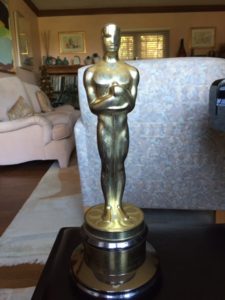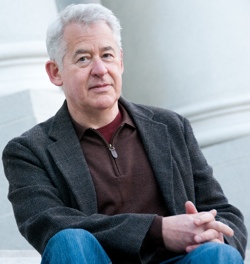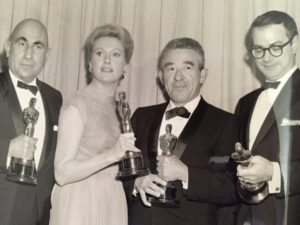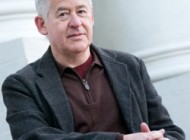 My father was blacklisted in Hollywood in 1953 and was unable to work under his own name for twelve years. He had been a staff writer on the TV sitcom I Married Joan when the ax fell. He was peremptorily fired, and effectively declared persona non grata throughout the industry. Now, to be clear, our family wasn’t destitute during the entirety of the blacklist period. There were some rather dicey years when he’d struggled to stay afloat, we lived on his savings and poker winnings , and he had to scrounge work using friends as “fronts.” He also tried his hand at a few failed business ventures, some of them quite clever but none of them successful. And we’d spent a year in England during which he’d written movies without credit and for scandalously little money, and blown through whatever he’d managed to squirrel away. One of the movies he wrote during that year, School for Scoundrels, was even proclaimed something of a comedy classic, a quintessentially English comedy classic. Ironic that it was written by a Brooklyn-born Jew. But in any case, the producer, a notorious Chicago-born gonif (you might well ask what were these people doing, adapting Stephen Potter, but that’s show biz for you) expressed his regret that he couldn’t credit my father or pay him an adequate fee. My suspicion is that he managed to contain his regret without too much strain. (Years later, the British Film Institute restored my father’s credit, along with that of Peter Ustinov, who had written an earlier, largely jettisoned draft.)
My father was blacklisted in Hollywood in 1953 and was unable to work under his own name for twelve years. He had been a staff writer on the TV sitcom I Married Joan when the ax fell. He was peremptorily fired, and effectively declared persona non grata throughout the industry. Now, to be clear, our family wasn’t destitute during the entirety of the blacklist period. There were some rather dicey years when he’d struggled to stay afloat, we lived on his savings and poker winnings , and he had to scrounge work using friends as “fronts.” He also tried his hand at a few failed business ventures, some of them quite clever but none of them successful. And we’d spent a year in England during which he’d written movies without credit and for scandalously little money, and blown through whatever he’d managed to squirrel away. One of the movies he wrote during that year, School for Scoundrels, was even proclaimed something of a comedy classic, a quintessentially English comedy classic. Ironic that it was written by a Brooklyn-born Jew. But in any case, the producer, a notorious Chicago-born gonif (you might well ask what were these people doing, adapting Stephen Potter, but that’s show biz for you) expressed his regret that he couldn’t credit my father or pay him an adequate fee. My suspicion is that he managed to contain his regret without too much strain. (Years later, the British Film Institute restored my father’s credit, along with that of Peter Ustinov, who had written an earlier, largely jettisoned draft.)
After that London year, my family returned to Los Angeles, as I’ve suggested, flat broke. But then, remarkably quickly, things began to look up a bit. My father adopted a pen name and began to get work in television under his new identity. Not that the people who hired him were under any illusions about whom they were hiring; with the exception of a few rightwing zealots like Ronald Reagan and John Wayne, the industry, liberal and conservative alike, hated the blacklist even if they were powerless to do anything about it. It was an intrusion on their freedom of expression and freedom of contract, and an injection of politics where politics didn’t belong. So Danny Thomas, for example, and Sheldon Leonard, and Carl Reiner (the last-named a friend of my parents for decades), knew they were hiring Frank Tarloff when they secured the services of his alter ego. They couldn’t have cared less, and no doubt were in addition happy to be of assistance to him. Of course they didn’t want so-called patriotic organizations breathing down their necks, threatening them with boycotts and bad publicity, but the rest was just bullshit as far as they were concerned. (I recall my father telling me that even Ozzie Nelson — who he guessed was in all probability a conservative Republican — had at least made an effort to resist kowtowing to the blacklist, which in his view constituted nothing beyond a mischievous interference with his ability to produce a TV show; the integrity of the republic was never actually hanging in the balance.)
There’s a funny story about the pen name my father chose, incidentally. He tells it in an unpublished memoir about the blacklist, but it’s worth repeating here. He originally picked a name consisting of my first and middle names — Erik Sheppard — and was proud of his handiwork, but his agent argued, ever so indirectly, that such a name might stand out and thereby attract undue attention. What the agent was actually getting at was that the name sounded too gentile. He wanted Frank to pick a name that was both vaguely ethnic and yet at the same time so bland as to be almost generic; he felt such a name would be less likely to twitch the antennae of any self-proclaimed Torquemada. “David Adler” fit the bill perfectly, and David Adler he became.
And he soon found himself with more work than he could handle. He wrote multiple episodes for The Danny Thomas Show, The Dick Van Dyke Show, The Andy Griffith Show, The Real McCoys, and many others. Frank Tarloff may have been blacklisted, but David Adler became a writer in demand.
But that didn’t mean he was happy with the situation. He wanted to write movies, not television, and that market remained closed to him. Frank Tarloff had some movie credits, but David Adler did not. Frank Tarloff felt unappreciated and artistically stifled. And so, after a couple of years in L.A. — refilling the exchequer, basically — he schlepped the family back to England.
Where he continued to write American TV episodes, sending them to Los Angeles via ordinary post (there was no email in those days). The name David Adler was on our home post box along with our real names. I suppose he must have received most of his second draft notes by telephone, although he did fly to California from time to time. If the producers hadn’t been personal friends, the arrangement would no doubt have been unthinkable. But he also quickly found work writing screenplays for British producers Betty Box and Peter Rogers. I think the School for Scoundrels non-credit must have proved to be a good calling card, since Brits in show biz were aware of his role in that production. Once again, he was low-balled abysmally on his fees, and none of the scripts he worked on — mostly adaptations of obscure or unpublished novels — survived the development process. But we weren’t going hungry. We lived fairly frugally, but I never felt deprived. The dollar stretched pretty far in Europe in those days, so his American TV earnings allowed a reasonable level of comfort. And the fact is, my father embraced frugality almost as an ethic, or even an aesthetic; during those years, he affected to disapprove of luxury and indulgence, he made that disapproval seem a central aspect of his character, an almost Roman Republic aversion to extravagance.
And then the gonif who had hired him for School for Scoundrels reappeared in his life. The guy was still based in Britain, still active on the Poverty Gulch fringes of the international film industry, and still looking for dependable writers whose services he could acquire on the cheap. And so they re-established their professional connection, although Frank was never anything other than wary about the association. Oddly, despite the man’s sketchy reputation, Frank rather liked him, even seemed to find his raffishness entertaining, at least in small doses; he just never trusted him. Still, it was employment, and the scripts he was hired to write were ostensibly for films, not TV, and he wasn’t in any case in a position to be picky. He wrote a number of screenplays for the guy, always at bargain-basement prices, and nothing ever came of any of them. Nothing, that is, until…
The producer had optioned the rights — no doubt for a pittance — to what I believe was an unpublished novella (although it might have always been a script treatment; I was never clear on that detail) called “A Place of Dragons,” written by a man I’ve otherwise never heard of called S. H. Barnett. (I recently googled him and discovered that he was in fact an American writer with some legitimate and respectable credits.) It was about a tough loner seaman in the Pacific conscripted into watching for Japanese war planes during World War II, and who suddenly finds himself playing reluctant host to a gaggle of refugee schoolgirls and their attractive guardian. And the producer assigned the script to his very reliable and very affordable house writer, Frank. Who wasn’t especially impressed with the source material — it was just another job to him — but he wrote the screenplay with his customary dispatch and professionalism, handed it in, and was ready for his next assignment. Based on past experience, his expectations of anything good happening must have lain somewhere between negligible and nil. So that seemed to be that. Or rather, that seemed to be that until…
Until the script somehow found its way into Cary Grant’s hands. God knows how that came about. It’s hard to believe the gonif had direct access to Cary Grant, so the pages must have taken a very circuitous route in order to find their way to him. But he somehow was handed the script, probably by one of his development people, read it, and decided he wanted to be in it. This was certainly the last thing anyone had anticipated. The lead role would be a departure for him, but that’s presumably exactly why it appealed to him; rather than playing his usual suave, insouciant self, the part called for him to be a rough, unshaven, misanthropic drunk. Another side of Cary Grant for sure! A major stretch for a superb and often underrated actor. And suddenly it was a whole new ball game. A big deal. At the time, Cary Grant was one of a small handful of the very biggest movie stars in the world. A Cary Grant picture was by definition an event.
At Grant’s urging, Universal Studios hired Peter Stone, fresh off Grant’s hit movie Charade, to revise the script as a Cary Grant vehicle. Something Frank always resented, and his resentment was compounded many times over when, a couple of years later, Stone was again hired to revise one of his screenplays, in this case for Paul Newman. And then wrote a column for the Los Angeles Times about getting joint credit with Frank while never having actually met him, let alone actually having worked together. I think the piece was pretty benign, at least in its intent, but Frank took it ill, interpreted as a slight or perhaps a bit of one-upmanship. (I’ll say in his defense that almost no one likes being re-written. All of us who work in an intrinsically collaborative medium like film have horror stories and a vast store of accumulated resentments.) Decades in the future, I became friends with Stone under an entirely independent set of circumstances, through some mutual East Coast friends, and I don’t think my father was at all pleased when he heard. He never called it a betrayal, but I think he may have regarded it as such. Stone himself was very cool about it; when we were first introduced, as we shook hands, he said, “I know. We’ll talk.”
It’s never easy to separate authorial vanity from objective judgment, but my father felt strongly that Stone’s draft cheapened some of the comedy and softened the Cary Grant character unnecessarily, and in the process almost apologized for his rough edges, those rough edges that in fact drove the whole story. I think the latter complaint probably had some merit, but it’s pointless for me to take sides at this remove.
I don’t remember what the title of the original draft was; I don’t think it was “A Place of Dragons,” I think it was changed to something else during the initial adaptation. But that detail is now lost to me. In any case, in the course of his own re-write, Stone had added a new detail concerning the Grant character’s emasculating code name, and thereupon changed the title once again to reflect the detail, calling it Father Goose. And so it remained.
Somehow — I wish I knew how, because I’m sure the story is interesting, but it’s now lost in the mists of history — Frank, at long last, after twelve years of either anonymity or being camouflaged as David Adler, was credited for his work. I don’t know if Frank or his agent insisted on the point during the negotiations, or if the producer offered it out of the kindness of his heart (very unlikely I should say, although, since it cost him nothing, it’s not impossible), or if the Writers Guild might have gotten involved. It may simply have been the result of blacklisted writer Dalton Trumbo’s having already been credited for his work on Spartacus and Exodus, thanks largely to the courage of Kirk Douglas and Otto Preminger; that eventuality may have created a precedent that signaled the blacklist was decisively broken. In any case, the credits now read “Screenplay by Peter Stone and Frank Tarloff, Story by S. H. Barnett.”
And then, since the movie, aside from boasting a big star, was also unobjectionable family fare, it became the Christmas feature at Radio City Music Hall. This was another major coup, guaranteeing extra attention for the picture and automatic respect. (Plus a lot of attractive ladies in skimpy outfits kicking in precise unison). And then, to our family’s astonishment and glee, Frank’s astonishment most of all, it was nominated for an Academy Award for Best Screenplay. And therein hangs another tale; it was originally entered in the category “Best Screenplay Adapted from Another Medium.” But someone — probably the gonif producer himself, who was never anything less than shrewd, and could easily discern the future dollar signs hanging in the balance — realized the competition in that category that year was extraordinarily stiff: Dr. Strangelove, Mary Poppins, My Fair Lady, and Zorba the Greek. Whereas the only really serious competition in the “Original Screenplay” category was Alun Owen for A Hard Day’s Night; the others were essentially cannon fodder. So that category seemed like a much safer bet. Perhaps that’s the moment “A Place of Dragons” suddenly transmogrified itself into a treatment rather than a novella.
For a period of a month or so before the nominations were official, it looked as if there might be a slightly edgy competition between my family and the family of one of my closest friends, Scott Johnson. The movie adapted from his half-sister Nora’s novel, The World of Henry Orient, with a screenplay by Nora herself and their father Nunnally, was rumored to be another nominee. It ultimately wasn’t, although it was nominated, along with Father Goose, for an award from the Writers Guild. Why it was passed over by the Oscars remains a mystery; it was a successful movie with a very good screenplay, and it starred Peter Sellers. But in anticipation of this potentially fraught situation, Scott, from his boarding school in Riverdale, New York, wrote me a very funny, faux-hostile letter, threatening to rent an airplane and drop leaflets all over Los Angeles urging Academy members to “vote for the man who writes funnily, vote for Nunnally.”
The Academy Awards took place during my spring break that year. My parents of course flew to Los Angeles for the festivities; they obviously anticipated a good time, because they went early and were gone for several weeks. My sister was studying in Paris at the time. My girlfriend was on a school-organized cruise to Norway. Scott Johnson was in New York. My other great friend from those years, Zachary Leader, was in London, and we saw a fair amount of each other, and his parents occasionally gave me a meal. But otherwise, I was alone in my parents’ flat in Belgravia. I went to a few concerts, did a great deal of reading, listened to lots of different music (Sidney Poitier had been in town a couple of months earlier, and when he headed back to Los Angeles had left me all his jazz records, which taken together constituted an education in a music I knew little about up to that time), I tried to learn to play K. 491 with mixed success, I did my own shopping, made my own meals, and managed the flat as best I could. Now, rest assured I’m not complaining, as solitary confinement goes it was pretty luxurious. But I did feel a little out of my depth, and I definitely wished my girlfriend hadn’t gone on that damned cruise.
Very early on the morning of April 6th — it was still the previous night in Los Angeles — my parents phoned with the news. Father Goose had won! They had won! They sounded giddy, understandably enough.
The next morning, my mother later reported, Cary Grant phoned them at their temporary lodgings in the Sunset Towers to offer his congratulations. A classy gesture on his part, somewhat marred by the fact that my mother was convinced it was one of their actor friends doing a Cary Grant imitation as a practical joke, and brusquely hung up on him. But he called back, was graciously amused about the misunderstanding, and the rest of the exchange went off without a hitch.
Many touching and some very funny telegrams and notes poured in. My father’s colleague Milt Josefsberg sent the following: “Dear Frank, What’s new?” The writer Marty Ragaway wrote, “Anyone who goes back to England now is just an ingrate.” Actor Martin Balsam and his wife wired, “Frank, we want you to know that regardless of what we saw tonight, we can still be friends.” There were many similar messages, either warm or facetious or both at once. The best may have been from writer Everett Greenbaum, who sent a one-word message: “Furious!”
After a few more days of celebration, they came home, Oscar in tow. It went up on the mantel piece immediately, of course. They gave a big party a few days later. They invited all their London friends, but that gold-plated statue was definitely the guest of honor.
A reel of film arrived in the mail soon after they got back. It was a clip of the part of the Oscars ceremony featuring Frank’s category. Altogether maybe four or five minutes long: Announcement of the winner, my parents’ shocked reaction, my mother’s squeal, their passionate kiss, Frank’s and Peter Stone’s dash to the stage, and their two brief thank you speeches (my father’s only six words long in its entirety). Somehow, it was arranged for a screening room in Soho to be made available to us, and my parents and I trooped over there one afternoon and watched the clip. And then watched it again. And again. And again. My mother kept calling out to the projectionist in the booth, “Could we see it again, please?” And he always complied. When we finally left the place, after having witnessed it God knows how many times, and she thanked the man for being so accommodating, he said, “Oh, it was my pleasure. And congratulations!” Very gracious, very British.
My father wasn’t an especially modest man, but his initial reaction to the award was nevertheless admirably self-effacing. He said the award was essentially a result of Cary Grant’s performance, and he also suggested it might have constituted a sort of tacit symbolic apology on behalf of the industry to all the victims of the blacklist. But I think he also privately regarded it, understandably enough after twelve years of career frustration, as a personal vindication. Even as proof of his worth as a writer. And that feeling, along with his suddenly, dramatically improved standing in the Hollywood community, began to have an effect. Very soon, my parents’ lives were going to undergo a radical change, and my father’s personality was going to change along with it.
Tags: Academy Awards Blacklist Cary Grant Dalton Trumbo David Adler Deborah Kerr Edward Anhalt Father Goose Frank Tarloff Hollywood Kirk Douglas London Los Angeles Martin Balsam Oscar Otto Preminger Peter Stone Screenplay Sidney Poitier The Andy Griffith Show The Danny Thomas Show The Dick Van Dyke Show The Real McCoys










0 Comment